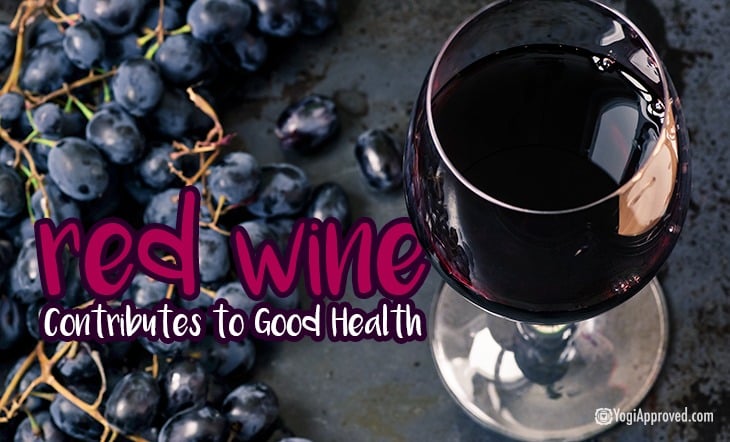4 Ways Drinking a Glass of Red Wine Contributes to Good Health – Cheers to That!

Did you know that your daily glass of red wine actually has numerous benefits? Scientific research proves imbibing in a little vino can be a great addition to your health.
Wine has actually been considered medicine as far back as 3000 B.C. in ancient Egypt. Archeologists have found jars in ancient Egyptian tombs with residues of wine, balm, coriander, sage and mint, which suggests wine was mixed with herbs and ingested to treat ailments such as stomach problems.
Red wine contains several antioxidants, which are linked to reduced rates of heart disease and cancer. Scientists have found that the darker the red wine, the higher the antioxidant content (i.e. a nice Cabernet Sauvignon). When consumed in moderation, red wine has been shown to help reduce the risk of cancer or stroke, protect your heart, and even improve brain function!
Here Are 4 Ways Red Wine Benefits Your Health:
1. Antioxidants
There are two main antioxidants contained in red wine that benefit your health. The first is resveratrol – a phytoalexin (protective antibiotic synthesized by plants) to fight infection. The antioxidant resveratrol has been shown to protect against cell damage and can actually help keep your mind sharp. It is also beneficial for your heart, helping to reduce the risk of heart disease and heart attack.
Resveratrol also improves blood flow by helping to remove chemicals that create blood clots. For example, a glass of red wine a day is proven to cut blood clot-related stroke rates in half. Resveratrol is also linked to longevity by protecting against the development of chronic diseases.
The second active antioxidant in red wine is quercetin. Quercetin is a naturally occurring phenol (a molecule that acts as a preservative) in grape skins and stems that protect grapes against ultraviolet light damage. In general, the more grapes are exposed to direct sunlight, the more quercetin they contain. Quercetin helps soak up many damaging free radicals that play a role in aging and age-related diseases.
According to the University of Maryland Medical Center, this antioxidant has been shown to inhibit the growth of cancer cells from breasts, colon, prostate, and ovaries, and it even hinders tumor growth. One of the biggest benefits of quercetin is its association with lower lung cancer risk.
2. Stress Relief
Stress wreaks major havoc on our health, so it’s extremely important to find ways to relax and unwind each day. It’s amazing how detrimental stress can be to our health and wellbeing. It has been said that stress is as damaging to your health as smoking five cigarettes per day! Studies show that stress has a major impact on cardiovascular health and increased risks of heart attack.
Many of us love to sit down with a glass of red wine at the end of the day to de-stress. We’re certainly not advocating to use wine as a sole method of stress relief (there’s yoga, meditation, and many other healthy, natural alternatives for stress relief). But having a glass of red wine is a great way to unwind and relax.
3. Support Heart Health
As explained in #1, the antioxidant resveratrol helps reduce the risk of heart attack and cardiovascular disease. Both resveratrol and quercetin have what’s called cardioprotective properties. Studies show that moderate red wine consumption can reduce the rates of coronary heart disease. The caveat is that consuming too much alcohol (including red wine) can increase your risk of cardiac mortality.
4. Maintain a Healthy Weight
Drink red wine for weight loss? A Purdue study explains how drinking red wine benefits weight management by blocking fat cell formation. Red wine contains a fruit compound called piceatannol which has been found to fight weight gain and obesity by preventing the accumulation of fat cells in the body.
Drinking Red Wine Benefits Your Health – In Moderation
It’s recommended you choose a red wine with grape varieties that have medium to high levels of antioxidants, such as merlot, zinfandel, syrah and petit syrah. Also, wines from regions with milder climates – Bordeaux, Burgundy, and Napa Valley – may have higher antioxidant levels than wines from hotter climates such as Languedoc and southern Italy.
No matter your choice in red wine, the key is to drink in moderation and aim to choose organic wines with little to no sulfites (as these tend to create morning headaches in some people). Drink to your health!
Did you know about the healing properties you can find in your wine? Were you as excited as we were? If you drink red wine for these healing properties, please share your favorite benefit!


This Month's Letter
From the Editor
Monthly motivation and food for
thought from our founder.


























